- Home
- Emma Chase
Royally Yours Page 3
Royally Yours Read online
Page 3
The next morning, I’m back at the palace at my vanity table, as Megan holds up two outfits for Miss Crabblesnitch to choose from.
And it feels like a lifetime has gone by. Like so much has changed.
Like I have changed.
I look at the ensembles in the mirror—a dove-gray skirt and blouse and a yellow, short-sleeved dress with buttons down the front. I already know which one Miss Crabblesnitch will choose.
There’s an old story about Vincent van Gogh eating yellow paint. Some say he did it because he wanted to die; others say that he was trying to raise his spirits by ingesting the cheery color. Maybe it was neither. Maybe he just said what the hell—and did it because he wanted to.
Because he could.
Because the choice was his to make.
I stand and turn toward the clothing in Megan’s arms. And I point to the yellow dress. “I’ll wear that one today.”
My secretary blinks at me. Then she lifts her pointy nose and sniffs. “Princess Lenora, that is not—”
“That one.”
I barely recognize my own voice. It comes from somewhere deep inside me, cold and clipped. And final.
Today, I will be yellow. Tomorrow I will be some other color.
But I will not be gray.
In-between, indecisive.
I will not float like a feather caught in a current, while others pull me in the direction they want and make my choices for me.
If I want to dance, I will dance. And if I choose to wear yellow, then yellow it will be.
Because what I know now, which I didn’t before, is that life is too short, too unpredictable and too cruel for anything less.
Palace of Wessco, 1955
IT’S BEEN SAID THAT ONE PERSON can change the world—and because of who my family is, I know for a fact that this is true. What I didn’t know was that one person can change your life. Fill in the empty, hollow spaces inside that you didn’t even know were there.
That’s what Thomas Rourke has done for me over the last two years. He’s become my rock and my fun skipping stone. The someone I’d been missing my whole life.
My friend.
The first and only and very, very best.
“There you are,” Thomas says from the stoop of Guthrie House. “I was just coming to see you.”
It’s dark out and late, and even the crickets in the garden have settled down for the night.
“You missed brandy and cigars.”
Brandy and cigars in the library after dinner is the manly powwow session of the powers that be—and Father always insists I attend. Because . . . politics. Keep your friends close and your enemies right up your arse. That’s how it works.
Thomas puts his hand over his heart. “And I’m all torn up about it, really. I had to finish reading the trade legislation for the vote tomorrow. Did you review it yet?”
I groan, like a student cramming for exams.
“No—I was planning on forgetting.”
“Sorry.” Thomas reaches into his jacket pocket and slips out a green glass bottle. “Maybe this will make up for it?”
Thomas Rourke isn’t just the young Duke of Anthorp—he’s a naughty boy. A terrible influence. And he’s taken me firmly under his wing.
“What is it?” I ask.
“Irish whiskey. Old Irish whiskey from my father’s personal collection. The bastard used to guard it like gold. I thought we’d crack it open together.” He wiggles his eyebrows. “A few nips will make that legislation go down a lot easier.”
I look over my shoulder—there’s not a guard or maid or a spying judgey secretary in sight.
“Come on, then.” I smile.
There’s a shadowy spot behind a big evergreen, hidden from the view of the guards at the palace wall. Thomas and I sit on the grass and I reach under the tree like it’s Christmas morning, for my secret white box. A moment later, I light my cigarette and tilt my head back to blow out a long, languid stream of smoke.
“If a photographer ever snaps a shot of you with a fag in your fingers, your father’s going to lock you in your room for a month.” He pulls the cork out with his teeth and takes a deep swig from the bottle—because we’re classy like that.
Then he chokes and sputters.
I give the bottle a sniff, then before I change my mind, I bring it to my lips and gulp quickly.
And I immediately regret the decision. It’s like drinking fire. I drop my cigarette and cough my esophagus up into my hands.
Like a lady.
“It burns,” I rasp, eyes watering.
Thomas winks. “That means it’s good.”
There’s more drinking—and coughing—and by my second cigarette I feel light and wonderfully floaty. Thomas pulls an arched, intricately hand-carved wooden pipe from his pocket.
“Oh, no, Thomas—not the pipe.”
“I like the pipe,” he mutters around it. “It makes me look distinguished.”
“It makes you look like Sherlock Holmes.”
“Exactly. Holmes is distinguished.”
I shake my head. “You keep saying that word—I don’t think you know what it means.”
He points at me with the hideous pipe. “Shut it, you. Or I’ll keep this all to myself.”
He holds up an envelope—with sharp, masculine handwriting on it.
Thomas gets a letter from his brother about every two weeks—it’s the most exciting thing in both our lives. And if I let myself think about that too much, I’ll drown myself in this terrible-tasting whiskey.
I pluck the letter from his fingers, turning it over in my hands.
“Did you read it yet?”
Thomas snatches it back. “No. But if I were a gentleman I would have. Especially after the last one that was all about the luscious tits and arse of the Egyptian girl who liked him so much.”
Naughtiness is strong in the Rourke family. But Edward’s is different from his brother’s.
Dirtier. Manlier.
I suppress an embarrassed giggle. “There were two Egyptian girls. And he liked them right back, from what I recall. At the same time.”
Edward’s letters are the perfect mix of eloquence, wit and vulgarity—sometimes he draws pictures, and he’s one hell of an artist. They’re more interesting than any film and more fun than that Elvis Presley hip swing all the American parents are losing their minds about.
They’re my peek into the outside world. The real world. A world of sweat and sex and fighting and dancing—where people walk on the grass barefoot and eat with their hands. A world where life doesn’t revolve around titles or etiquette and double-damned political mind games.
Thomas opens the envelope and reverently unfolds the letter. He gives his pipe a puff—coughs twice because he shouldn’t be smoking it—then begins to read.
“Dearest Thomas,
“I’ve stopped in Sweden for a few days, to stock up on gear on my way to a climbing expedition in Greenland. I arrived by train—hopped a boxcar—not the most elegant way to travel, but it’s quick and interesting. And there’s something freeing about having everything you own in the world strapped to your back in a pack. If you get the chance, I recommend it.
“I met a family of indigents in the car—a pretty mum, dad, little boy and cute girl. They shared their supper with me and despite their circumstances, they seemed happy. Content. Grateful for the food in their stomachs and the temporary roof over their heads. The lad was about seven or eight—with dark hair and glasses that were too big, but close enough for him to use. He reminded me of you. I left the few hundred kroner I had beside him while the family slept, then I jumped off at my spot, while the train rumbled on.”
I’ve never seen a picture of Edward, but in my mind he’s taken on a life of his own. Roguishly handsome, strong and charming, he lives the life of a hero-pirate-Viking-god. The kind of man who works in the sun, shares a pint with a friend, flirts with the prettiest lass, and manages to rescue an orphan or two from a burning building before h
e calls it a day.
Edward Rourke is the most exciting man I’ve never met.
“I’m writing to you now from a quiet hillside, with a campfire and tent beside me and the Northern Lights over my head. I’d heard aurora borealis is a stunning sight, something you have to see to believe—and Christ, they were right. It’s like a river in the sky of the most magnificent colors. Swirls of greens and reds and deep purple—all dancing together, a living symphony of color. It’s magic made real, like I can reach out and touch it. I don’t have the words to do it justice. I wish you were here, Thomas. I wish you could see this.
“I’ll be in Sweden until the end of the week; send your reply to the post address in Greenland below. I hope all is well with you, little brother, and I look forward to hearing from you more than I can say. Stay out of trouble—or, more to the point—don’t get caught making trouble. And don’t do anything I wouldn’t do (which of course isn’t much).
“Yours,
“Edward.”
Sometimes he stays in one place for a few weeks or a few months, but never for good. I watch Thomas’s eyes light on the bottom of the page, before his lips curl up into a grin.
“PS—give my regards to Lenny.”
Warm, rushing sparks of electricity spread under my skin like some incurable rash.
Lenny. That’s me. What Edward calls me in his letters, because Thomas has told him we’re friends. It’s the most ridiculous name. Only slightly less ridiculous than the effect it has on me.
“Are you blushing, Lenora?” Thomas asks.
I turn up my nose. “I don’t blush. It’s your stupid Irish whiskey going to my head.”
I grab the letter and lie back on the cool grass, scanning it to make sure Thomas didn’t leave anything out. Then, subtly, I bring the paper to my nose and inhale. There’s a hint of pine and freshly cut wood.
“Did you just smell my brother’s letter?”
Perhaps not so subtle after all.
I lie like the stellar politician I’m being raised to be.
“I have no idea what you’re talking about.”
“You did! You sneaky, sniffing, lying princess—you smelled the letter!”
“You’re batty.”
Thomas’s tone turns singsongy teasing.
“I think you have a crush on my brother.”
“I think that pipe is making you soft in the head.”
“You think he’s top-notch.”
I refuse to answer; my lips are closed. My cold shoulder has been known to freeze people to death.
“I’m going to tell him.” He pokes. “I’m going to say, ‘James Dean has nothing on you, Edward, because Princess Lenora is totally gone for you.’”
Like a cobra striking, I reach up and yank a few strands of his hair out, at the nape of his neck where it’ll really hurt.
“Ow! Fucking hell!”
“I’ll have you killed. I know people. I’m a princess on the edge—don’t push me.”
“You can’t have me killed—I’m the only friend you’ve got.”
I flop back on the grass, shrugging. “That’s a sacrifice I’m willing to make.”
Chuckling, Thomas tucks the letter in his pocket, then lies back on the grass beside me, our heads just a few inches apart.
“I think Winston fancies you,” he says softly.
Maddox Winston is the newest addition to my personal security team. He’s mysterious in a cold, brusque sort of way. Rumor has it he was a notorious assassin during the war.
I roll my eyes. “Oh, bollocks.”
Thomas glances at me. “No, truly. The way he watches you . . .”
“He’s on my security team—he’s supposed to watch me.”
Thomas shakes his head. “Not the way he does it.”
I ignore that comment and gaze up at the sky. There are no clouds tonight, just a thousand silver-white dots of light glowing brilliantly. And I think about Edward’s letter.
“Do you ever wish you could trade places with Edward? That you had left and he had stayed here?”
In the dim light, Thomas’s face is as pale as the stars—it makes him look like a bespeckled marble statue. A rascal angel.
“No. I couldn’t serve in the military because of the asthma, but I’ve always wanted to do my part. Something more than just inheriting the Rourke money. Parliament is my chance to do that. To make a difference, leave my mark. And maybe if I do it well, someone somewhere will remember me. I think I’d like that . . . to be remembered.”
I turn my head toward him.
“I’ll remember you.”
He smiles softly. “Well, that’s one person, at least.”
“I’m heir to the throne, silly. My remembrance is worth a thousand commoners’.”
Thomas snorts. “What about you? Do you ever wish you were Miriam?”
Miriam went a little mad after Mother died. If I’m a rule-breaker now, she’s a full-out revolutionary. Sometimes she goes out wearing trousers . . . and no bra. Yesterday she was caught for the second time this month with a boy in her room—an earl’s son we’re actually distantly related to—a fourth something-or-other twice removed. Father’s ready to box her up and ship her to a convent on the next train out.
“No, I wouldn’t trade places with Miriam. This life can be suffocating and stupid, but one day I’m going to be able to do amazing things, Thomas. I feel it in my bones. Being first anything is always hard, but I’m going to do it. And when I do, I’m going to change the world.”
I tilt my head back to the sky, but in my mind’s eye, instead of black, I see vibrant swirls of green and deep purple and fiery orange-red.
“Still . . . aurora borealis . . . it must be incredible.” I can hear the longing in my own voice. The yearning for a piece of something outside the palace walls. Something new and wild and real.
“I would love to see it.”
“So, fuck it all and go see it.” Thomas sits up and plucks the blades of grass out of the ground. “Like Edward, he gets an idea in his head, something he wants to do—and he does it. Simple as that. No hesitation. No doubt.”
I shake my head. “I’m needed here; Father would never let me. And even if he did, it wouldn’t be like Edward—on a hillside with a tent and a campfire. There’d be press and security and servants. It would all be a . . . shit-show.”
Thomas laughs, but in a subdued, sympathetic sort of way.
I wave my hand—I have no patience for self-pity, even when it’s my own.
“Oh, listen to me going on—the poor princess. Irish whiskey makes me go all pitiful.”
Thomas stands, brushes off his trousers and offers me his hand, pulling me up. “Then it’s time for you to sleep it off, Pitiful Princess.”
“I will. After I do my required reading.”
The dark-haired joker lifts his hand to the sky, like he’s reciting Shakespeare. “Mirror, mirror on the wall, what is the boringest of them all?”
“Trade legislation!” we say in unison.
I heard a new term the other day on an American television show—nerds. I’m fairly certain that’s what Thomas and I are.
He walks me to the door.
“Good night, Thomas.”
“Pleasant dreams, Lenora.”
Thomas bows, then he slips his hands in his pockets and heads down the path, whistling a quick, cheery tune.
Palace of Wessco, 1956
IT BEGAN SLOWLY, subtly, the way terrible things often do. A flinch, a pause, a grimace of pain—my father hid it well, but I noticed. And I wasn’t the only one—rumors and whispers filled the palace like a moldy stench. Within months it graduated to the occasional postponed meeting, then missed functions that I attended in his place, delayed starts to his schedule and finally, whole bedridden days.
And here is where it ends.
In the royal apartments, the antechamber of the King’s bedroom. My uncle is here—my father’s youngest brother, the Duke of Warwitch. They’ve never been especially
close, but he’s on the Advising Council, so he’s here. A few of the men in this room have genuine affection for my father, and they chat easily with the ones who don’t. The ones waiting like vultures, ready to swoop in and claim their chunk of the carcass.
Because that’s how this works.
“The King is dying.”
Those words were delivered to me two days ago by Alexander Bumblewood, the Prime Minister, who was the only man the King’s doctors informed. Like a morbid version of the telephone game.
That’s the way it goes. Secrecy is paramount. Because governments don’t do change well, and monarchies . . . despite all our rules and laws and traditions . . . we’re bloody awful at it. Historically, change brought power struggles—it used to be all false imprisonments, murders, full-out wars and royal heads rolling.
We’re better now.
More . . . outwardly civilized. But the hidden, hushed motivations—ambition, fear, greed—those will remain for as long as humans are humaning.
Miriam and Alfie step out from my father’s bedroom. Alfie’s nose is red and he wipes at his watery eyes with a handkerchief. He tries to give me a smile, but he can’t quite manage it.
And that cracks something inside me—a small fissure in the veneer I’ve lacquered to perfection.
Miriam shudders with great, gasping sobs—openly and unashamed. My sister’s always been emotional, wearing her heart on her sleeve for all to see. A young blond footman guides her from the room with his arm around her. If I had it in me, I’d make it clear he’s being too familiar—but I’m too drained.
“The King is asking for you, Your Highness,” The Prime Minister says.
I look to Thomas beside me and his kind green eyes offer me comfort. I’ve got you, they say. I’m with you.
And none of it feels real. It’s like a foggy dream. A day I knew would come but didn’t really believe ever would.
The inner room is as well-equipped as any hospital’s. Beeping monitor wires and pain-relieving tubes stick out from beneath Father’s papery skin. His doctor, the King’s Physician, is here; he bows to me before stepping back to a respectful distance.

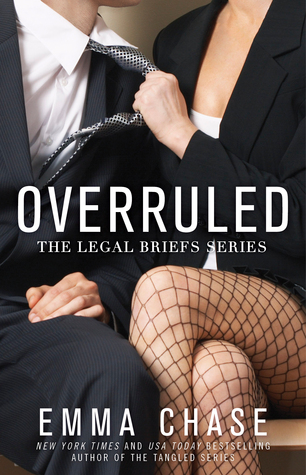 Overruled
Overruled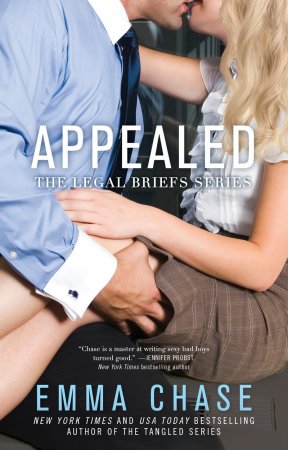 Appealed
Appealed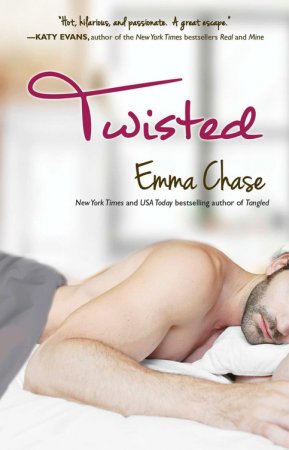 Twisted
Twisted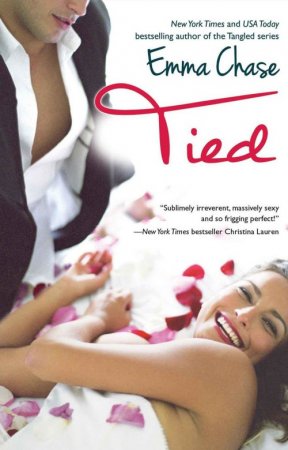 Tied
Tied Royally Screwed
Royally Screwed It's a Wonderful Tangled Christmas Carol
It's a Wonderful Tangled Christmas Carol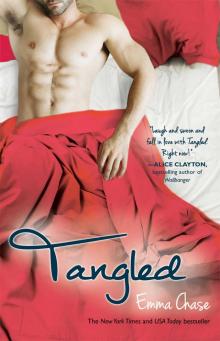 Tangled
Tangled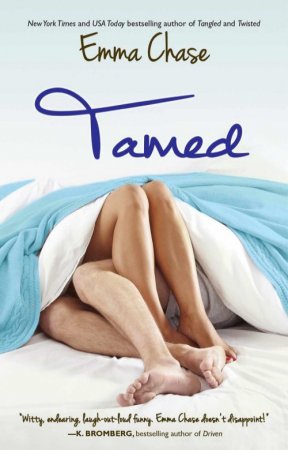 Tamed
Tamed Sidebarred
Sidebarred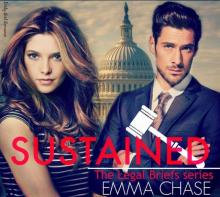 Sustained
Sustained Tangled Extra Scenes
Tangled Extra Scenes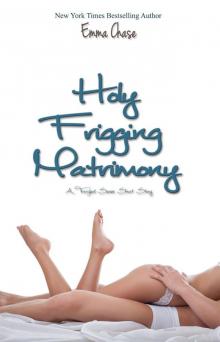 Holy Frigging Matrimony: A Tangled Series Short Story
Holy Frigging Matrimony: A Tangled Series Short Story Getting Schooled
Getting Schooled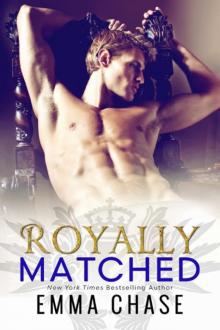 Royally Matched
Royally Matched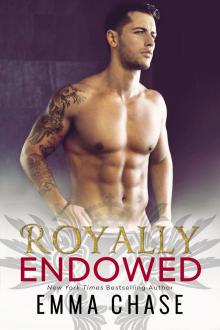 Royally Endowed
Royally Endowed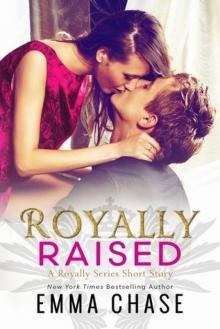 Royally Raised
Royally Raised Dirty Charmer
Dirty Charmer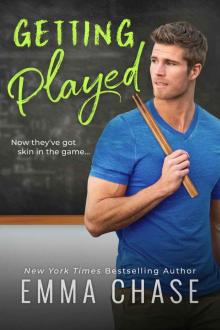 Getting Played (Getting Some Book 2)
Getting Played (Getting Some Book 2)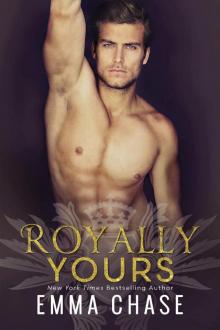 Royally Yours
Royally Yours